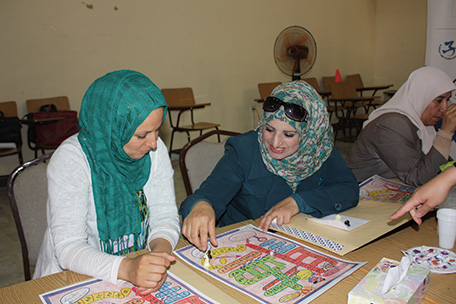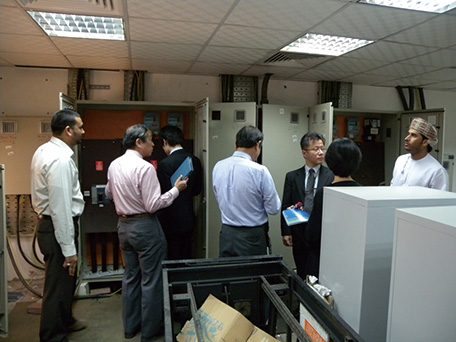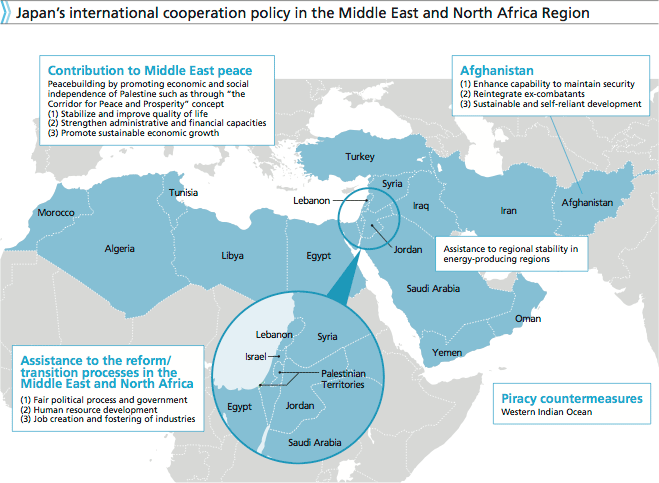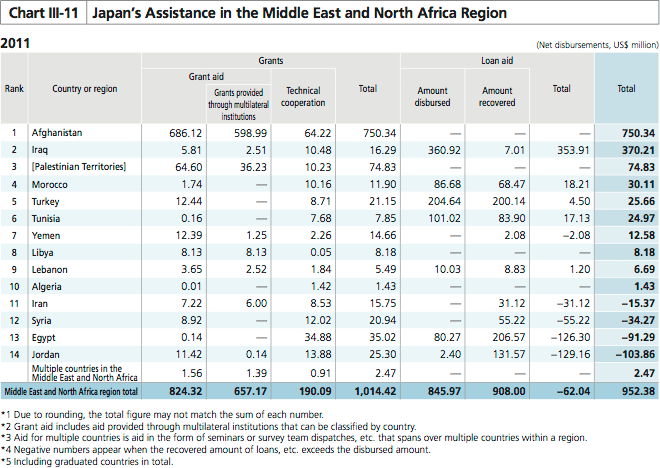Japan's Official Development Assistance White Paper 2012
4. Middle East and North Africa
The Middle East and North Africa region is a huge supply center for the world's energy; it contains about half of the world’s oil reserves and around 40% of the world's natural gas reserves. Japan depends on the Middle East and North Africa for about 90% of its crude oil imports, and the core sea trading routes linking Japan and Europe pass through the region, so the Middle East is an exceptionally critical region for Japan's economy and energy security as well.
The region experienced major political upheaval from 2011 to 2012. Longstanding regimes collapsed and many countries held elections and revised their constitutions, and, for the most part, the democratization process is proceeding peacefully.
However, economic and social conditions still have not improved, and the real fight for reform lies ahead. Some countries in the region still face unstable conditions. Encouraging reform efforts in such countries through financial assistance and contributing to stability in the region is linked not only to those countries and their neighbors but also to peace and stability in the rest of the world.
This region contains many countries whose populations feature high percentages of young people and will continue to grow economically, and it is important to support these promising countries so that they can continue to achieve that stable growth.
<Japan's Efforts>
In the Middle East and North Africa, there are many countries and regions with devastated living and social infrastructure and security problems including Palestinian issue, Afghanistan and Iraq. Peace and stability in these countries and regions have a huge impact on the stability and prosperity of the region and the rest of the world. The international community's concerted support is vital to the achievement of sustainable peace and stability and nation-building and national reconstruction in these countries and regions. Because of this position of the Middle East and North Africa, there is significant meaning in Japan’s proactive support.

Training to improve the capacity of local government partner staff members in Jordan. (Photo: Kyoko Sato)
Starting in Tunisia in December 2010, citizens frequently staged massive demonstrations all around the Middle East and North Africa. In particular, Tunisian and Egyptian regimes were ousted by demonstrators, and this led the political process to support the democratic transition, launching a truly historic period of reform in the region. However, a variety of reforms and transitions to new systems have only just begun in these countries of the Middle East and North Africa. The governments must not only move toward "democratic political systems," but must also overcome many socio-economic problems (high unemployment, rising food prices, widening gaps between the rich and the poor, etc.). That means the countries in the region are facing a critical period. Achieving such reforms and transition to new systems in a stable manner is also vital to the establishment of peace and stability in these regions. This requires a higher degree of assistance from the international community as well. At the G8 Deauville Summit, France held in May 2011, the G8 leaders called the historic changes taking place in the Middle East and North Africa the "Arab Spring," welcoming these changes and affirming the G8’s collective support for the efforts.
Economic circumstances in the Middle East and North Africa vary, from high-income oil-producing nations to low-income Least Developed Countries and countries that are in a period of post-conflict reconstruction. Japan believes that achievement of peace and stability in Afghanistan and Iraq, and achievement of Middle East peace, are issues related to the peace and security of the overall international community, and have deep significance from the standpoint of human security and peacebuilding, both of which are basic principles of Japan's ODA Charter. Japan therefore provides active assistance to these regions, working together with the international community. For oil-producing countries, by promoting the diversification of industry as well as continued economic growth, Japan cooperates in the countries’ efforts to build stable economic foundation while moving away from oil dependent economies.
For low and middle-income countries that lack oil and other natural resources, Japan continues to provide assistance to reduce poverty and achieve sustainable economic growth. In particular, at high-level meetings (those from the G8 Summit in Deauville onward) responding to the changes taking place in the regions while working with the international community, and building on its past experiences in contributing to the growth and stability of Asia, Japan announced its policy to support Middle Eastern and North African countries' own self-help efforts for stable transition and various domestic reforms by working in close partnership with the private sector, as well as with relevant government-affiliated agencies.
The policy is based on the following measures supporting (i) fair political process and government, (ii) human resource development, (iii) job creation and fostering of industries, and advancing (iv) economic relationships and (v) mutual understanding. In that vein, Japan pledged $1 billion of ODA loans in September 2011 and has already determined or pledged to support $1.4 billion of new infrastructure improvements. Further, the management of valuable water resources, which impacts the stability of the region, is an important challenge shared by the countries of the Middle East and North Africa. Japan, giving appropriate consideration to the areas of assistance and target priorities in each country, supports proactively building the environment to facilitate socio-economic stability in the region, and to achieve Middle East peace.
The points of focus are as follows.
- Peacebuilding (Iraq, Afghanistan, Palestinian-Israel conflict)
- Middle East peace process (assistance to the Palestinians, aid to the surrounding Arab countries, etc.)
- Fair political process and government (including electoral assistance in Egypt and Tunisia, addressing disparity and enhancing stability by implementing aid projects in such areas as rural development, poverty reduction, water resources development, disaster prevention, and counter-terrorism and security)
- Human resources development, socio-economic infrastructure development for job creation, and fostering of industries
(See this for details regarding Afghanistan, Iraq and Palestine)
●Oman
Project for Energy Conservation Master Plan in the Power Sector
Technical Cooperation Project for Development Planning (January 2012 - Present)
People do not pay much attention to power conservation in Oman because electricity rates are low. Over 90% of the demand for power in Oman is satisfied by burning natural gases produced domestically. However, as power consumption has skyrocketed in recent years due to increased population and economic growth, planned blackouts have been occurring in summer. Thus, energy conservation has become a critical issue. Japan performed a rationalized survey on the electricity supply and demand management system in Oman from 1997 to 1998. The study suggested a system to optimally manage the power grid to meet demand and help power providers improve their systems. However, hardly any efforts were made on the consumer side at that time.
Oman then asked Japan to help encourage its consumers to conserve energy, and Japan began the Project for Energy Conservation Master Plan in the Power Sector in February 2012.
This plan is based on on-site surveys and energy diagnosis to determine the electricity use at factories, other business sites, buildings, stores and homes. With introducing Japan's experience and technology, it has been discussed the effectiveness and priority of policies such as energy consumption management for companies, creation of standards for and promotion of energy-efficient products, and activities to raise awareness of energy conservation. By March 2013, Japan plans to present an Energy Conservation Master Plan that includes a road map to 2020.
(As of December 2012)

Surveying power management conditions at an office building with Japanese experts. (Photo: JICA)


